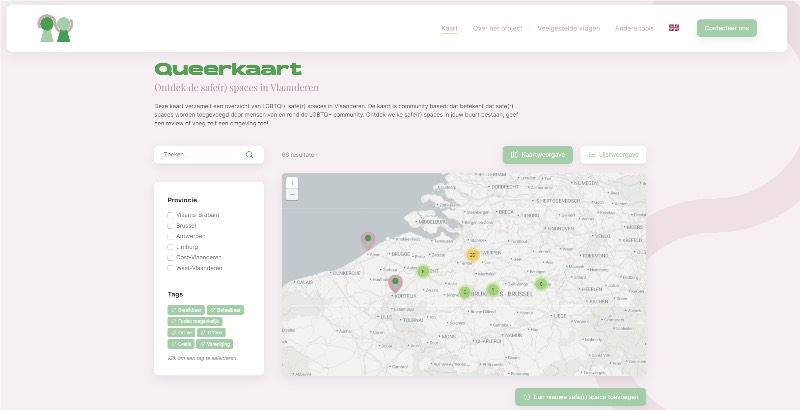In recent years, awareness has increased about the need for safe(r) spaces, environments where LGBTQIA+ people, among others, can be themselves. But where can you find safe(r) spaces in Flanders? It’s a question many LGBTQIA+ people and their allies are asking. Queerkaart.be tries to answer that question, with a clear map where people in and around the LGBTQIA+ community can look for and find safety.
There are – or perhaps were – many so-called gay maps of cities, showing queer bars, cafés, clubs, saunas, bathhouses, darkrooms, hotels, … catering to mostly gay men or other people engaging in gay activities. Queerkaart.be has a different angle.
A survey by LGBTQIA+ organisations Wel Jong and çavaria within the Safe(er) and Trusted Environments (Veilige(re) en Vertrouwde Omgevingen) project revealed that LGBTQIA+ people do need safe(r) spaces, but do not always know where to find them. To meet this need, the project is launching Queerkaart.be.
This is an interactive, community-based, online map where gay, lesbian, bisexual, transgender, queer, intersex people and their allies can find safe(r) spaces, add spaces themselves and also leave reviews. Queerkaart must become a living tool for LGBTQIA+ people who are looking for a safe environment where they can be themselves.

Video series gives a face to safe(r) spaces
To further give a face to the diversity of people who work with safe(r) spaces, the project also created a video series. The online series, which consists of three episodes, interviews 10 organizations about what safety means to them, how they create safety and why they find it so important. In the first video, which is now online, you will recognise Lotus Li from Untold Asian Stories, Charlie and Maïté from the FLINTA party concept Female Boyfriends and the people behind the queer and feminist café Blond from Ghent.
FLINTA is an acronym which originated in the Berlin queer scene and means “Frauen, Lesben, Intergeschlechtliche, nichtbinäre, trans und agender Personen” or Female, Lesbian, Intersex, Trans and Agender persons.
Queerkaart.be is an addition to the toolbox on safe(r) spaces that was already published in March. With these tools, other organizations and initiatives in and around the LGBTQIA+ community in Flanders can work to facilitate safe(r) spaces.
Queer Belgium
- Limburg Pride 2025 to be hosted by Hasselt on Sunday 13 July.
- Liège Pride 2024 on 23, 24 and 25 August.
- Queer March Ghent 2024 on Saturday 30 March at Viernulvier.
- Brussels Pride – The Belgian & European Pride 2024 on 18 May: Safe Everyday, Everywhere.
- BELGIUM | First Limburg Pride on Saturday 5 July 2025.
- PROGRAMME | Queer Arts Festival Leuven 2023 from 3 to 25 November.
- FLANDERS | LGBTQIA+ people more often unhappy, bullied and misjudged.
- Queer Arts Festival Leuven with pride parade from 3 to 25 November 2023.
- SPARTACUS GAY TRAVEL INDEX 2023 | Belgium 17th most gay travel friendly country; Malta on 1, Canada and Switzerland share 2nd.
- 1 in 3 LGBTQIA+ people in Flanders and Brussels experienced physical aggression in the past two years.
- EXHIBITION | ‘Homosexuals and Lesbians in Nazi Europe’, Kazerne Dossin, Mechelen.
- RainbowPages: interactive website promoting visibility, findability and safety by and for LGBTQIA+ people.
- Forbidden Colours helped over 500 queer refugees to flee war in Ukraine .
- ‘LGBTQIA+ BXL, Collecting Memories’ Exhibition in Brussels City Museum.
- MSK Gent – Museum of Fine Arts Ghent introduces LGBTQ+ tour.
- ANTWERP | LGBTQIA+ bookshop Kartonnen Dozen stops.
- City chronicle ‘De kleur van de stad maakt mijn ziel amoureus’ recounts Queer Antwerp history.
- Will Belgium win the Eurovision Song Contest ever again?.

25 Comments Add yours